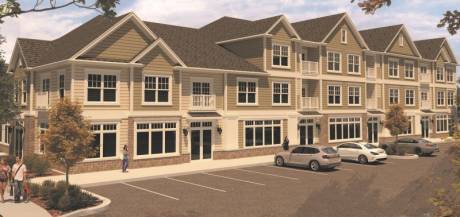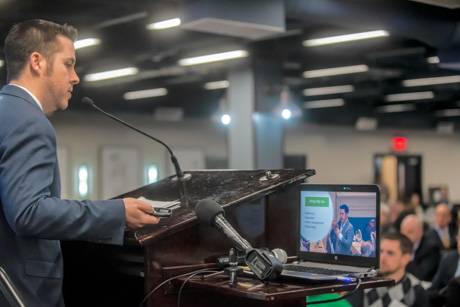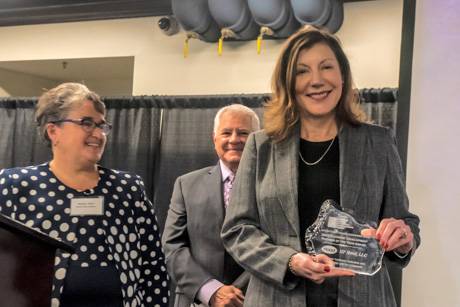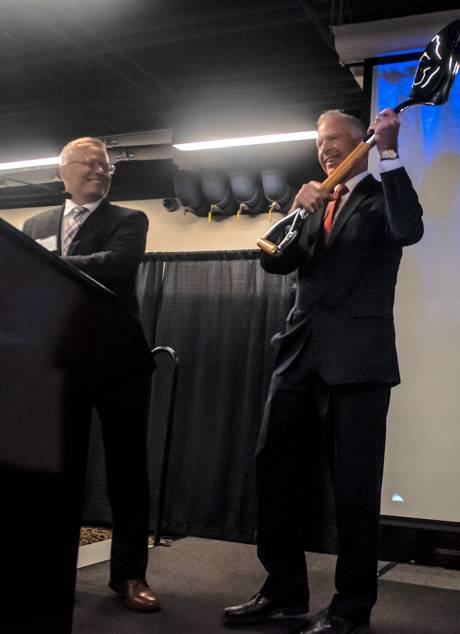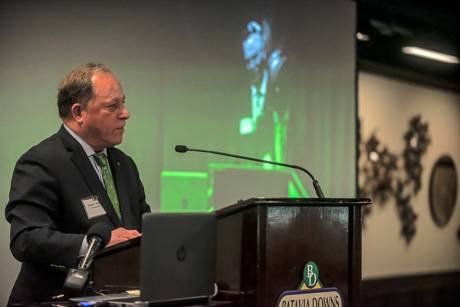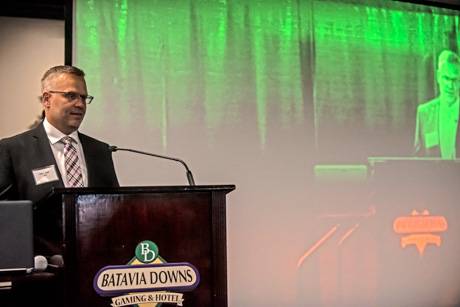Press release:
Citing concerns that China is catching up to the United States in microelectronics production capacity, U.S. Senator Charles E. Schumer today (June 28) unveiled the American Foundries Act, a bipartisan initiative that seeks to reestablish U.S. leadership and revitalize innovation in the global microelectronics sector.
Schumer explained that the bipartisan legislation would make critical investments in domestic commercial and defense-related microelectronics manufacturing and research and development, and address economic and national security concerns by decreasing U.S. dependence on foreign-made semiconductor chips.
“The economic and national security risks posed by relying too heavily on foreign semiconductor suppliers cannot be ignored, and Upstate New York, which has a robust semiconductor sector, is the perfect place to grow this industry by leaps and bounds,” Senator Schumer said. “America must continue to invest in our domestic semiconductor industry, including companies like GlobalFoundries, ON Semiconductor, IBM and Cree right here in New York, in order to keep good-paying, high-tech American manufacturing jobs here at home.
"We need to ensure our domestic microelectronics industry can safely and securely supply our military, intelligence agencies, and other government needs. This is essential to our national security and to U.S. leadership in this critical industry."
The senator noted that even though the United States revolutionized the microelectronic industry and invented much of the key technology used to this day, competitors in Asia, especially China, have made huge investments into their microelectronics industries in recent years to challenge U.S. leadership. In fact, Schumer pointed out, 78 percent of cutting-edge wafer fabrication capacity is now based in Asia, with last year being the first year that North America fell behind China.
Schumer has long-championed increased efforts to expand the domestic microelectronics industry, supporting companies like GlobalFoundries, which houses their most advanced "Fab 8" manufacturing facility in Malta, New York, IBM, and others.
With New York home to multiple major companies and research institutions in the semiconductor industry, the state is positioned to securely supply the U.S. government with critical technologies and maintain U.S. leadership in this technology, offering a tremendous opportunity for New York’s semiconductor companies to expand operations, create more jobs in Upstate New York, and help the United States reduce its reliance on foreign semiconductor manufacturing.
Specifically, supporters of the American Frontiers Act include GlobalFoundries, IBM, ON Semiconductor, Cree Inc., the Genesee County Economic Development Center, Hudson Valley Economic Development Corporation, Mohawk Valley EDGE, Cornell University, Binghamton University, and SUNY Polytechnic Institute.
"We applaud the powerful American Foundries Act of 2020 co-sponsored by Senator Schumer and the impressive, bipartisan list of Senate leaders,” said Tom Caulfield, CEO of GlobalFoundries. “Senator Schumer has supported semiconductor manufacturing and GlobalFoundries for many years and this legislation seeks the quickest route to boosting chip production in the U.S. We appreciate this timely and significant contribution as Congress and the Administration work through the best approach for federal investment to restore domestic leadership in semiconductor manufacturing.”
"The U.S. semiconductor industry drives economic growth through technological breakthroughs and plays a critical role in the nation’s security,” said John E. Kelly III, Executive Vice President, IBM. “IBM strongly supports the American Foundries Act of 2020 because this important legislation would sustain American leadership in semiconductor technology and establish a national strategy to move it forward. We thank Senators Schumer and Cotton for their leadership on this bill and urge the Senate to pass it quickly."
“The American Foundries Act is a bold step to respond to the aggressive incentives available to overseas competitors and reverse the decline of semiconductor manufacturing in the United States,” said Keith Jackson, president and CEO of ON Semiconductor. “ON Semiconductor urges the Congress to quickly advance legislation to promote American semiconductor research and manufacturing.”
“Cree continues to invest aggressively in silicon carbide manufacturing and research in order to support the growing, global demand for our technologies, and we believe advanced semiconductor manufacturing is essential to leading the acceleration of critical next-generation technologies," said Gregg Lowe, president and CEO of Cree Inc. "Like many other semiconductor companies in the U.S., we believe this legislation would provide necessary investments that move our industry and economy forward and we commend its introduction."
"Senator Schumer has long recognized that our 1250-acre STAMP site in Genesee County presents a tremendous opportunity to create thousands of high quality semiconductor jobs for the Western New York and Finger Lakes regions," said Steve Hyde, president and CEO of the Genesee County Economic Development Center (GCEDC).
"Our challenge has always been the considerable cost to get the site developed and shovel ready in the global competition to land projects of this scale. This legislation though is a game changer in so many ways as it will support cutting-edge domestic semiconductor development and increases in semiconductor manufacturing capacity at a crucial time in our nation's history."
“Senator Schumer’s American Foundries Act is the type of innovative, bipartisan legislation that we need to build on our regional strengths and grow the Hudson Valley economy post-pandemic," said Mike Oates, president and CEO of Hudson Valley Economic Development Corporation. "With industry leaders like IBM, GlobalFoundaries, and soon ON Semiconductor right here in the Hudson Valley, it is no secret that investing in the microelectronics manufacturing and research and development space will enhance our ability to manufacture semiconductor chips, create jobs, and reimage our economy.
"HVEDC is proud to support Senator Schumer in his push to bolster our footprint in the growing semiconductor sector and we will continue working with him to keep the Hudson Valley on the map as a global industry leader.”
“Construction of new microelectronics and semiconductor fabrication facilities have the ability to change the economic landscape of a region and the proposed American Foundries Act proposed by Senator Schumer is a strategic investment to secure the United States’ position as a global leader in microelectronics and semiconductor R&D,” said Steven J. DiMeo, president, Mohawk Valley EDGE.
“As our economy shifts away from the long-standing model of industrialism coupled with the uncertainty of a global pandemic, we now more than ever need the federal government to continue its support of game-changing industries like semiconductors and microelectronics. The construction of Cree’s state-of-the-art 200 mm enabled SiC semiconductor facility at the Marcy Nanocenter in Upstate NY, is a pivotal example of what can be done when all stakeholders are working together to advance our high-tech ecosystem and regional economy and maintain the United States’ global competitiveness.”
Emmanuel P. Gianellis, vice provost for Research and Vice President for Technology Transfer, Intellectual Property and Research Policy at Cornell University, said, “Senator Schumer has long recognized that the best way to keep America at the forefront of the technology revolution is to invest in research and development here at home.
"Not only does the American Foundries Act of 2020 direct critical resources into expanding the domestic production of microelectronics, it also points the way to the future with substantial funding for research and innovation. Cornell University is pleased to support this legislation and commends Senator Schumer for his leadership.”
"Whether we are talking about technology that enables advancement in AI for autonomous vehicles, smart energy for a greener environment or flexible wearable devices for human health and industrial monitoring, the United States government must remain on the frontlines, supporting industrial and academic innovations in advanced electronics manufacturing," said Harvey Stenger, president of Binghamton University.
"We once again acknowledge all that Sen. Schumer has done and continues to do to emphasize the importance of research and development efforts in private labs as well as at research institutions like Binghamton University. We thank the senator for this latest effort to apply resources to enhance the bridge from early R&D to at-scale manufacturing that will lead to breakthroughs in next-generation semi-conductor research and keep the United States competitive and a leader in the global economy."
“Leadership in the microelectronics industry is critical for America’s continued economic and strategic competitiveness on the global stage," said SUNY Polytechnic Institute Interim President Grace Wang, Ph.D. "The American Foundries Act of 2020 will provide a more strategic national approach in advancing microelectronics capabilities, R&D, and workforce development and ensure our nation remains at the forefront of impactful innovation.
"This bill takes a bold approach to facilitate chip fab modernization efforts and investment in key areas such as fabrication, assembly, test, and advanced packaging to strengthen our nation’s technological independence and agility for years to come.”
Schumer said he will aim to include the legislation as an amendment in this year’s National Defense Authorization Act (NDAA).
Senator Schumer introduced the American Foundries Act of 2020 in the Senate, along with Senators Cotton (R-Arkansas), Reed (D-Rhode Island), Hawley (R-Missouri), Gillibrand (D-New York), Risch (R-Idaho), Jones (D-Alabama), Collins (R-Maine), King (I-Maine), and Rubio (R-Florida), and details of the bill can be found below:
Support for Commercial Microelectronics Projects: Authorizes the Department of Commerce to award $15 billion in grants to states to assist in the construction, expansion, or modernization of microelectronics fabrication, assembly, test, advanced packaging, or advanced research and development facilities.
Support for Secure Microelectronics Projects: Authorizes the Department of Defense to award $5 billion in grants for the creation, expansion, or modernization of one or more commercially competitive and sustainable microelectronics manufacturing or advanced research and development facilities capable of producing measurably secure and specialized microelectronic for defense and intelligence purposes. This funding may go to primarily commercial facilities capable of producing secure microelectronics.
R&D Funding: Authorizes $5 billion in R&D spending to secure U.S. leadership in microelectronics. Requires agencies that receive this funding to develop policies to require domestic production, to the extent possible, for any intellectual property resulting from microelectronics research and development as a result of these funds.
The new R&D funding would be broken up as follows:
- $2 billion for DARPA’s Electronics Resurgence Initiative
- $1.5 billion for the National Science Foundation
- $1.25 billion for the Department of Energy
- $250 million for the National Institute of Standards and Technology
National Microelectronics Research Plan: Establishes a subcommittee of the President’s Council on Science and Technology to produce a report each year to guide and coordinate funding for breakthroughs in next-generation microelectronics research and technology, strengthen the domestic microelectronics workforce, and encourage collaboration between government, industry, and academia.
Safeguards: Prohibits firms owned, controlled or otherwise influence by the Chinese government from accessing funds provided by the legislation.

